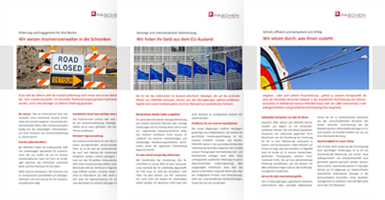Latest News / Entry

New regulations on the right to contest: Insolvency law experts discuss reform law
Just two months after coming into effect, the Act on the Reform of the law of avoidance of transactions in insolvency proceedings and for the first time since the inception of the new legislation, top experts in the field of the right to contest law met at the PraxisFORUM Insolvenzanfechtung in Frankfurt.
As expected, the participants had very different views concerning the evaluation of the reform law as a whole. However, they agreed that one could not simply continue with a business as usual approach.
Prof. Dr. Godehard Kayser, chairman of the 9th Civil Senate of the Federal Court which is responsible for insolvency law, said that it is now the task of the Justice to contribute to the practical implementation of the jurisprudence by “filling numerous new and indeterminate legal terms with life”. Examples of those indeterminate legal terms which require interpretation by the jurisdiction are particularly the “unfair” act of the debtor mentioned in § 142 InsO or “common business practices” mentioned in the same section. Kayser announced that his Senate will set “normative limits” here and will not follow alleged or actual common practices without their own assessment. In order to determine which common business practices within the assessment of contestation cases could be accepted it will be necessary to follow standards the jurisdiction has deemed worthy to be considered.
Dr. Bero-Alexander Lau and Dr. Marlene Maesch from White & Case are more doubtful. They are concerned that “the Court of Appeals could now feel encouraged to accommodate creditors significantly in the future considering the reversal of the burden of proof according to § 133 para. 3 section 2 InsO”.
Ralf Zuleger of UniCredit Bank München AG has a different point of view. In the margin of his speech on the aspects of bridging and restructuring loans, he once more referred to the strong effects the uncertainty of pre-emptive action had on creditors, often from medium-sized companies. He welcomed the reform in right to contest, in particular the new possibilities in the fields of payment terms and cash transactions.
Attorneys at law Lutz Paschen and Michael Schmidt presented the participants with impressive examples of their daily practice from the creditor’s perspective. Their presentation particularly pointed out how the Federal Court’s previous handling of the topic had affected economic life.
One focus was the presentation of economic consequences concerning the granting of trade credits, the negative impacts on business ethics and legal consulting practice as well as specific examples of documented cases of abuse.
Paschen and Schmidt expressed their hope that the reform will not only lead to improvements in the granting of payment facilities, but also lead to a significant improvement of legal certainty in cash transactions. Furthermore, they praised the gain in planning security by reduction of the period of challenge to four years for cover transactions. Finally, they expressed the expectation that the reform in general would lead to the Court of Appeals being forced to refrain from the often practiced slavish application of the principles of the case law of the Federal Court of Justice, in favour of the overall assessment of the circumstances in individual cases the Federal Supreme Court actually has demanded.


